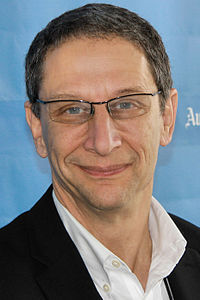fiction.wikisort.org - Writer
David Louis Finkel (born October 28, 1955) is an American journalist. He won a Pulitzer Prize in 2006 as a staff writer at The Washington Post.[1][2] As of January 2017, he was national enterprise editor at the Post.[3] He has also worked for the Post's foreign staff division. He wrote The Good Soldiers and Thank You for Your Service. He is a 2012 MacArthur Fellow.[4]
Work
Finkel's book The Good Soldiers describes several months he spent in 2007 as an embedded reporter with 2nd Battalion, 16th Infantry Regiment of the 4th Infantry Brigade Combat Team, 1st Infantry Division, also known as the "2-16 Rangers", as they worked to stabilize a portion of Baghdad.[5]
The logs of Chelsea Manning's IM chats with Adrian Lamo state that David Finkel had the video which was released as Collateral Murder by WikiLeaks but did not release it.[6] David Finkel has never publicly disclosed whether he had the video or not. In a washingtonpost.com webchat, he said, "I based the account in my book The Good Soldiers on multiple sources, all unclassified. Without going into details, I'll say the best source of information was being there [in Iraq]."[7] At a February 2013 pretrial hearing, Manning stated that Finkel "was quoting, I feel in verbatim, the audio communications of the aerial weapons team crew." She said, however, that she was "aghast" at Finkel's portrayal of the incident. "Reading his account," she explained, "one would believe the engagement was somehow justified as 'payback' for an earlier attack that led to the death of a soldier."[8]
Awards
- 1995 Missouri Lifestyle Journalism Award for a story about racial and class conflict.
- 2001 Robert F. Kennedy Awards for Excellence in Journalism International Print Prize for "Invisible Journeys" about illegal immigration.
- 2006 Pulitzer Prize for Explanatory Reporting, citing "his ambitious, clear-eyed case study of the United States government's attempt to bring democracy to Yemen."[1]
- 2010 Cornelius Ryan Award for The Good Soldiers.[9]
- 2010 J. Anthony Lukas Book Prize for The Good Soldiers.[10]
- 2013 National Book Critics Circle Award (Nonfiction) shortlist for Thank You for Your Service[11]
- 2014 Erikson Institute Prize for Excellence in Mental Health Media (awarded by the Erikson Institute of the Austen Riggs Center) for his investigative reporting at The Washington Post.[12]
Education
- Bachelor's degree in broadcasting from the University of Florida in 1977.
Personal life
He lives in the Washington, DC area.[13]
References
- "The 2006 Pulitzer Prize Winners: Explanatory Reporting". The Pulitzer Prizes. Retrieved 2013-11-01. With short biography and reprints of 3 works (December 2005 Washington Post articles).
- "Nieman Narrative Digest". Archived from the original on September 5, 2006.
{{cite web}}: CS1 maint: bot: original URL status unknown (link) - "Chico Harlan, Jessica Contrera join National Enterprise team". January 12, 2017.
- "2012 MacArthur Foundation 'Genius Grant' Winners". AP. Archived from the original on October 2, 2012. Retrieved July 25, 2017.
{{cite web}}: CS1 maint: bot: original URL status unknown (link) - "Book Discussion on The Good Soldiers". C-SPAN. 5 October 2009. Retrieved 26 April 2015.
David Finkel talked about his book The Good Soldiers (Farrar, Straus and Giroux; September 15, 2009). In his book he recounts the fifteen months he spent with Army Battalion 2-16, part of the U.S. forces that carried out the surge in 2007-2008. Battalion 2-16 was charged with securing part of Baghdad. Mr. Finkel read passages from his book and talked about his experiences with the soldiers in Iraq. He talked about how their tour of duty changed the soldiers and their evaluations of the success of the surge. He also responded to questions from members of the audience.
- Poulsen, Kevin; Zetter, Kim (10 June 2010). "'I Can't Believe What I'm Confessing to You': The Wikileaks Chats". Wired.
- Finkel, David (6 April 2010). "Video shows death of 2 Reuters employees in Baghdad attack". The Washington Post.
- "Bradley Manning's statements during his trial". The Guardian. London. 1 March 2013.
- "The Cornelius Ryan Award 2009". opcofamerica.org. April 22, 2010. Retrieved November 14, 2020.
- "J. Anthony Lukas Prize Project winners". Nieman Foundation for Journalism at Harvard. Retrieved 16 March 2011.
- "Announcing the National Book Critics Awards Finalists for Publishing Year 2013". National Book Critics Circle. January 14, 2014. Retrieved January 14, 2014.
- "Erikson Prize for Excellence in Mental Health Media - Austen Riggs Center".
- http://www.pritzkermilitary.org/whats_on/pritzker-military-presents/david-finkel-thank-you-your-service/ Promotional announcement for Finkel's 2013 appearance at the Pitzker Military Library
External links
- Appearances on C-SPAN
- Lecture on The Good Soldiers at the Pritzker Military Museum & Library
- Lecture on Thank You for Your Service at the Pritzker Military Museum & Library
- Interview on ABC RN with Paul Barclay about The Good Soldier.
- David Finkel at Library of Congress Authorities, with 2 catalog records
Другой контент может иметь иную лицензию. Перед использованием материалов сайта WikiSort.org внимательно изучите правила лицензирования конкретных элементов наполнения сайта.
WikiSort.org - проект по пересортировке и дополнению контента Википедии
